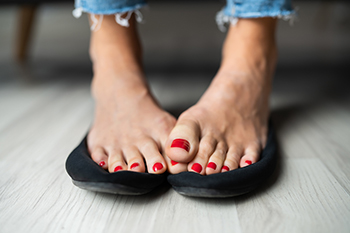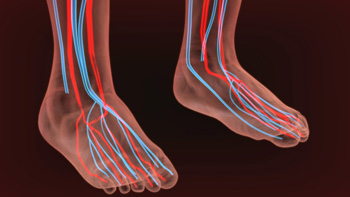
Obesity casts a profound shadow over foot health, influencing various aspects of function and well-being. Excessive body weight places immense pressure on the feet, exacerbating biomechanical stress and strain. The increased load on weight-bearing structures, such as joints, ligaments, and tendons, can lead to structural changes, including flattening of the arches and misalignment of the foot bones. Consequently, individuals with obesity are more susceptible to foot ailments such as plantar fasciitis, osteoarthritis, and stress fractures. Moreover, the excess fat tissue surrounding the feet may impede circulation and impair healing processes, predisposing to conditions like peripheral artery disease and delayed wound healing. Mobility and balance may also be compromised, increasing the risk of falls and injuries. Addressing obesity through lifestyle modifications, including dietary changes and regular exercise, is essential not only for overall health but also for managing the adverse effects on foot health. If you are overweight and have developed foot pain, it is suggested that you contact a podiatrist who can help you with relief and management tips.
Obesity has become very problematic at this point in time and can have extremely negative effects on the feet. If you’re an obese individual and are concerned about your feet, contact one of our podiatrists from Palmetto Podiatry Group of Anderson. Our doctors can provide the care you need to keep you pain-free and on your feet.
Obesity and Your Feet
Since your feet are what support your entire weight when standing, any additional weight can result in pain and swelling. Being overweight is one of the main contributors to foot complications.
Problems & Complications
Extra Weight – Even putting on just a few extra pounds could create serious complications for your feet. As your weight increases, your balance and body will shift, creating new stresses on your feet. This uneven weight distribution can cause pain, even while doing the simplest tasks, such as walking.
Diabetes – People who are overweight are at serious risk of developing type-2 diabetes, which has a drastic impact on the health of your feet. As you get older, your diabetes might worsen, which could lead to loss of feeling in your feet, sores, and bruises. You could also become more prone to various infections.
Plantar fasciitis – Pressure and stress that is placed on muscles, joints, and tendons can trigger plantar fasciitis, which is an inflammation of tissue that forms along the bottom of the foot.
If you have any questions please feel free to contact our office located in Anderson, SC . We offer the newest diagnostic and treatment technologies for all your foot and ankle needs.

Plantar hyperhidrosis, a condition characterized by excessive sweating of the feet, poses challenges for those affected, often leading to discomfort and embarrassment. Several factors contribute to this condition, including overactive sweat glands triggered by the sympathetic nervous system. Genetics play a significant role, as individuals with a family history of hyperhidrosis are more prone to developing the condition. Hormonal changes, such as those occurring during puberty or menopause, can also exacerbate sweating. Additionally, medical conditions like diabetes, thyroid disorders, and infections may contribute to plantar hyperhidrosis. Psychological factors like stress, anxiety, or nervousness can further amplify sweating episodes. Furthermore, wearing tight or poorly ventilated footwear, particularly in warm climates, can worsen symptoms. If you are affected by plantar hyperhidrosis, it is strongly suggested that you visit a podiatrist who can provide you with effective relief methods.
If you are suffering from hyperhidrosis contact one of our podiatrists of Palmetto Podiatry Group of Anderson. Our doctors can provide the care you need to attend to all of your foot and ankle needs.
Hyperhidrosis of the Feet
Hyperhidrosis is a rare disorder that can cause people to have excessive sweating of their feet. This can usually occur all on its own without rigorous activity involved. People who suffer from hyperhidrosis may also experience sweaty palms.
Although it is said that sweating is a healthy process meant to cool down the body temperature and to maintain a proper internal temperature, hyperhidrosis may prove to be a huge hindrance on a person’s everyday life.
Plantar hyperhidrosis is considered to be the main form of hyperhidrosis. Secondary hyperhidrosis can refer to sweating that occurs in areas other than the feet or hands and armpits. Often this may be a sign of it being related to another medical condition such as menopause, hyperthyroidism and even Parkinson’s disease.
In order to alleviate this condition, it is important to see your doctor so that they may prescribe the necessary medications so that you can begin to live a normal life again. If this is left untreated, it is said that it will persist throughout an individual’s life.
A last resort approach would be surgery, but it is best to speak with your doctor to find out what may be the best treatment for you.
If you have any questions please feel free to contact our office located in Anderson, SC . We offer the newest diagnostic and treatment technologies for all your foot and ankle needs.

When it comes to foot health, circulation plays an important role. Poor circulation can lead to discomfort, swelling, and severe complications. However, there is a natural solution that often gets overlooked, which is vitamins. Incorporating essential vitamins into your diet can significantly improve foot circulation and overall vascular health. Vitamin E, known for its antioxidant properties, aids in widening blood vessels and promoting efficient blood flow to the extremities, including the feet. Similarly, vitamin C supports collagen production, strengthening blood vessel walls and enhancing circulation. Additionally, vitamin B3, or niacin, has vasodilating effects, meaning it helps widen blood vessels, thus improving blood flow. Additionally, omega-3 fatty acids, while not vitamins per se, are essential for cardiovascular health. Found in abundance in fish oil and certain seeds, omega-3s can reduce inflammation and enhance blood circulation throughout the body, including the feet. By incorporating these essential nutrients into your diet through whole foods or supplements, you can effectively improve foot circulation, ensuring optimal foot health and comfort for years to come. If you have poor foot circulation and are seeking relief techniques, it is suggested that you consult a podiatrist who can discuss how vitamins can play a role in treatment.
Poor circulation is a serious condition and needs immediate medical attention. If you have any concerns with poor circulation in your feet contact one of our podiatrists of Palmetto Podiatry Group of Anderson. Our doctors will treat your foot and ankle needs.
Poor Circulation in the Feet
Poor blood circulation in the feet and legs is can be caused by peripheral artery disease (PAD), which is the result of a buildup of plaque in the arteries.
Plaque buildup or atherosclerosis results from excess calcium and cholesterol in the bloodstream. This can restrict the amount of blood which can flow through the arteries. Poor blood circulation in the feet and legs are sometimes caused by inflammation in the blood vessels, known as vasculitis.
Causes
Lack of oxygen and oxygen from poor blood circulation restricts muscle growth and development. It can also cause:
- Muscle pain, stiffness, or weakness
- Numbness or cramping in the legs
- Skin discoloration
- Slower nail & hair growth
- Erectile dysfunction
Those who have diabetes or smoke are at greatest risk for poor circulation, as are those who are over 50. If you have poor circulation in the feet and legs it may be caused by PAD and is important to make changes to your lifestyle in order to reduce risk of getting a heart attack or stroke. Exercise and maintaining a healthy lifestyle will dramatically improve conditions.
As always, see a podiatrist as he or she will assist in finding a regimen that suits you. A podiatrist can also prescribe you any needed medication.
If you have any questions please feel free to contact our office located in Anderson, SC . We offer the newest diagnostic and treatment technologies for all your foot and ankle needs.

